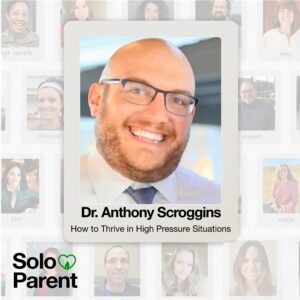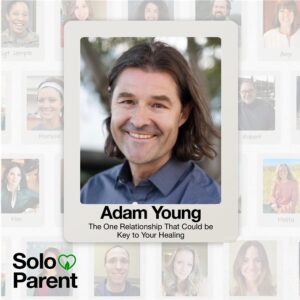You’re bone-tired, mentally scattered, barely holding the emotional thread of the day together. So you reach for your phone…again. Not because it will help, but because it feels like the only thing you have the capacity to do.
If that’s familiar, you’re not alone.
Solo parents live in a world of constant demands. Technology offers an escape, a shortcut, a quick answer. But underneath the convenience lies a deeper problem. Our digital habits aren’t just coping mechanisms. They’re shaping who we are, rewiring our ability to connect, to trust, to wonder. And for many of us, they’re silently eroding the very things that make healing and growth possible.
In this conversation with Amber Fuller – a counselor with a Masters in Marriage and Family Therapy (MMFT) – we explore how our digital world is training us in ways we don’t even realize—and how reclaiming stillness might be one of the most healing things we can do.
Key Insights from This Episode
- Instant answers are replacing deep trust
- Constant connectivity comes at a real cost
- Stillness is a muscle, and you can rebuild it
If we’re being honest, most of us don’t realize just how much we’ve been shaped by the digital world. What seems like harmless scrolling or convenient Googling has actually started to rewire the way we think, relate, and connect. In this episode, a few truths stood out, and they carry particular weight for those of us navigating life as solo parents.
Amber shared something that stuck: “I could Google anything now and find someone else’s answer. But what about the answer that God has for me?” As a teenager, she refused to read devotionals because she wanted to hear from God directly. That meant sitting with questions, not skipping to someone else’s conclusions.
This slow, sacred way of learning is at odds with the speed we’ve come to expect. Robert Beeson, Founder of Solo Parent, added that he’s noticed it in his own life, especially in how he relates to God. “We’ve lost our ability to linger, to wonder, to believe without immediately solving everything.”
For solo parents, this matters. When you’re used to surviving in high-alert mode, the idea of slowing down or sitting in discomfort can feel inefficient, even dangerous. But without those moments of stillness, we lose something vital: the chance to hear from the One who knows our story better than we do.
The wear-and-tear of being always “on” isn’t just emotional. It’s physical, spiritual, and relational. Amber talked about realizing her hand was sore at the end of the day from holding her phone. That was the wake-up call she didn’t expect.
Elizabeth Cole, a single parent, pointed out how often we start the day by checking our health apps or texts before we even check in with ourselves. “I’ve noticed I go straight to my Oura Ring to see how I slept before I ever ask myself how I actually feel.”
That automatic reach for the phone is a symptom of something deeper: a loss of presence. Not just presence with ourselves, but with our kids, our friends, and even God. And the tech world knows this. As Elizabeth put it, “Every scroll is monetized. They profit off our attention. And time is the one thing we can’t get back.”
When you’re raising children alone, your bandwidth is already stretched. The cost of divided attention may not show up all at once, but it compounds. We feel it in our anxiety, in our decision fatigue, and in our difficulty truly resting.
Stillness is a muscle, and you can rebuild it.
Reclaiming stillness doesn’t require a total digital detox or a silent retreat (though Robert did try one, and the story was moving). It starts smaller than that, like sitting for one minute before grabbing your phone, or taking a walk without earbuds.
“You’ve been trained to scroll for 30 minutes,” Elizabeth said. “So you can retrain yourself to sit for five.”
Amber shared how replacing screen time with something tangible—like crafting or painting—helps reorient her toward rest. It’s not about punishing yourself or creating another rule. It’s about noticing what makes you feel grounded, and doing more of that on purpose.
And when you do, something subtle happens. Time slows down. Joy surfaces. Presence returns. “We don’t make space for nothingness,” Robert said. “But when we do, we start to notice things we didn’t even realize were missing.”
Listener Question of the Week
“What has been the most impactful Solo Parent episode for you?”
Robert reflected on an early episode with Sissy Goff about emotional entitlement and the importance of letting kids struggle. “It convicted me. I realized I was stepping in too much, not letting my kids develop their own resilience.”
Amber pointed to the loneliness episode with Dr. Chip Dodd. “That episode reminded me that loneliness isn’t a flaw. It’s a signal. It means we were made for connection.”
Elizabeth shared how Lori Lokey’s episode on healthy relationships changed the trajectory of her year. “I’ve made some major life shifts because of that one conversation.”
RESOURCES MENTIONED IN THIS EPISODE:
We want to answer any Solo Parent questions you may have. Submit your listener questions HERE.
Additional Resources:




